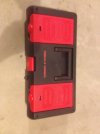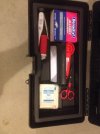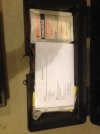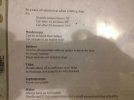NSAIDs (acetaminophen, aspirin, ibuprofen, naproxen) are quite dangerous for dogs if you don't give them the perfect dose, so I'd consult a vet for your dog specifically regarding pain relievers.
I have a pair of dog booties I always take with, in case a foot gets torn up. Don't need all four, as I don't have them wear them all the time, but good in case of a minor pad injury, so they can keep rolling.
If you live/hunt in areas where buzzworms are encountered, I'd highly recommend snake conditioning training. You can do it yourself with an e-collar and a harmless snake you find, or find a vet/trainer/organization that offers a class.
Get a small sticker picker to carry along (with metal teeth). Furrier dogs like yours (and mine) can get way out of hand quickly...
View attachment 476203
Hydrogen peroxide and/or activated charcoal and/or milk of magnesia for poisoning. Can induce vomiting with H2O2, and AC/MOM will help bind and pass toxic stuff. This is another one you should consider carefully, and discuss with a vet, as H2O2 is a non-trivial intervention. H2O2 also good for antiseptic obviously.
Not much else comes to mind that isn't also included in a normal "human" first aid kit (e.g. gauze, tweezers, tape, etc.)
Convenience items...
1) Collapsible water bowl. I like the silicone ones that flatten. A really small one, that they can just fit their face in is best for hiking. Less water waste, and less to carry.
2) Towel. Dogs are gross. Really, really gross. When yours finds that perfectly rank dead snake lying in a fresh cow pie, you'll be glad you have a towel...
3) Paracord/line that can be used for a longer tie out/leash in a pinch.
Congrats on your new partner! Watching the pure joy of a dog on the hunt is about as good as it gets.





